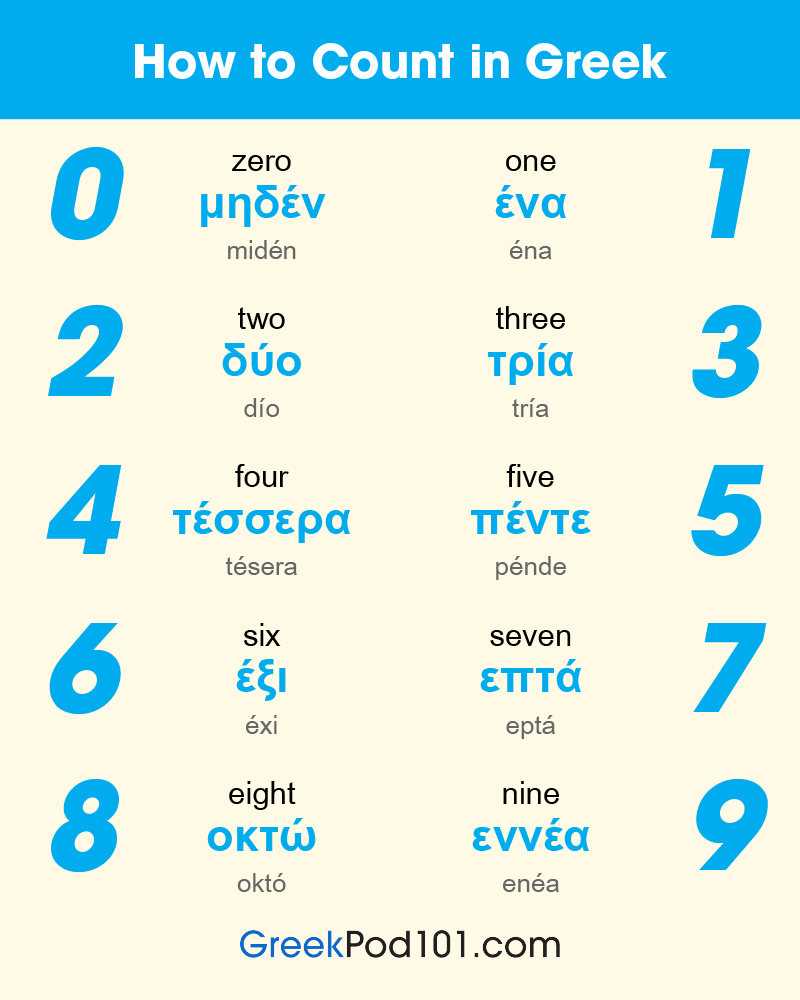Numbers are all around us. Therefore, learning how to count in Greek will surely come in handy at one point or another. In this article, you’ll learn how to write and pronounce Greek numbers and how you can use them in everyday life with GreekPod101.com.
Numbers in Greek have changed over the years. The original Greek number system was developed in ancient Greece and included the use of alphabet letters instead of numbers. As centuries passed by, the use of ancient Greek numbers faded away and Greeks started to use the Hindu-Arabic numeral system, which is still used today.
That said, let’s go on ahead and learn more about numbers in the Greek language, as well as more information about Greek numerals.
Table of Contents
- Greek Numbers 0-9
- Greek Numbers 10-99
- Greek Numbers up to 1000
- Cardinal Numbers in Greek
- Ordinal Greek Numbers
- Everyday Use of Greek Numbers
- Conclusion
1. Greek Numbers 0-9
The Greek numbers from 0 to 9 are demonstrated below, accompanied by their pronunciation.
- 0 – μηδέν (midén)
- 1 – ένα (éna)
- 2 – δύο (dío)
- 3 – τρία (tría)
- 4 – τέσσερα (tésera)
- 5 – πέντε (pénde)
- 6 – έξι (éxi)
- 7 – επτά (eptá)
- 8 – οκτώ (októ)
- 9 – εννέα (enéa)
This is the base of almost all numbers, so make sure you study them thoroughly.
Do you feel like listening to each number’s pronunciation? Check out our Greek Numbers List.
2. Greek Numbers 10-99
Learning how to count in Greek is easy. However, there are a few particularities you should definitely watch out for. Let’s take a look at the numbers from 10-19.
- 10 – δέκα (déka)
- 11 – έντεκα (éndeka)
- 12 – δώδεκα (dódeka)
- 13 – δεκατρία (dekatría)
- 14 – δεκατέσσερα (dekatésera)
- 15 – δεκαπέντε (dekapénde)
- 16 – δεκαέξι (dekaéxi)
- 17 – δεκαεπτά (dekaeptá)
- 18 – δεκαοκτώ (dekaoktó)
- 19 – δεκαεννέα (dekaenéa)
All of the above numbers consist of one word, of which the prefix indicates the first digit and the suffix represents the second digit.
The first difficulty you’ll probably face is learning the numbers 11 or έντεκα (éndeka) and 12 or δώδεκα (dódeka). These are the only two-digit numbers that don’t follow the aforementioned rule.
When it comes to numbers 20-100, here’s a preview:
- 20 – είκοσι (íkosi)
- 21 – είκοσι ένα (íkosi éna)
- 22 – είκοσι δύο (íkosi dío)
- 23 – είκοσι τρία (íkosi tría)
Note a major change at this point. Every number greater than 20 consists of two words. Again, in this case the first word refers to the first digit and the second word indicates the second digit respectively. Another thing you might have noticed is that 21 or είκοσι ένα (íkosi éna) and 22 or είκοσι δύο (íkosi dío) just follow the rule.
So, what happens for greater numbers? The idea is the same, so each number will consist of two words. The first one will be one of the following, accompanied by a second word which will indicate the second digit 1-9.
- 20 – είκοσι (íkosi)
- 30 – τριάντα (triánda)
- 40 – σαράντα (saránda)
- 50 – πενήντα (penínda)
- 60 – εξήντα (eksínda)
- 70 – εβδομήντα (evdomínda)
- 80 – ογδόντα (ogdónda)
- 90 – ενενήντα (enenínda)
As shown above, the second digit, which is 0 or μηδέν (midén,) isn’t pronounced in Greek, as each of these words has a unique one-word name.
3. Greek Numbers up to 1000
Feeling puzzled? Don’t worry, your struggle pretty much ends here!
For numbers 100-999 the only additional thing you need to learn is how the hundreds are pronounced.
- 100 – εκατό(ν) (ekató(n))
- 200 – διακόσια (diakósia)
- 300 – τριακόσια (triakósia)
- 400 – τετρακόσια (tetrakósia)
- 500 – πεντακόσια (pendakósia)
- 600 – εξακόσια (exakósia)
- 700 – επτακόσια (eptakósia)
- 800 – οκτακόσια (oktakósia)
- 900 – εννιακόσια (eniakósia)
- 1000 – χίλια (hília)
So, in the case of three digit numbers, the only thing you need to add is a word indicating the hundreds. All the rest is the same. Please note that only for the number 100 or εκατό (ekató) we omit the final “ν” (n) of the word. For numbers above 100, we include the final “ν” (n).
- 100 – εκατό (ekató)
- 101 – εκατόν ένα (ekatón éna)
- 102 – εκατόν δύο (ekatón dío)
- 103 – εκατόν τρία (ekatón tría)
- 104 – εκατόν τέσσερα (ekatón tésera)
…….
- 110 – εκατόν δέκα (ekatón déka)
- 111 – εκατόν έντεκα (ekatón éndeka)
- 112 – εκατόν δώδεκα (ekatón dódeka)
- 113 – εκατόν δεκατρία (ekatón dekatría)
……..
- 120 – εκατόν είκοσι ένα (ekatón íkosi éna)
- 121 – εκατόν είκοσι δύο (ekatón íkosi dío)
- 123 – εκατόν είκοσι τρία (ekatón íkosi tría)
……….
4. Cardinal Numbers in Greek
Cardinal numbers are considered adjectives in Greek, so they need to agree in gender, number, and case with the noun they define. So, let’s have a look at the following examples.
 |
 |
 |
Masculine Noun
- Greek: Ένας σκύλος.
- Romanization: Énas skílos.
- Meaning: “One dog.”
Feminine Noun
- Greek: Mία γάτα.
- Romanization: Mía gáta.
- Meaning: “One cat.”
Neutral Noun
- Greek: Ένα πουλί.
- Romanization: Éna pulí.
- Meaning: “One bird.”
As you can figure out from the above examples, the number 1 gets inflected according to the gender of the noun it’s referring to. Learn more animals in Greek and their gender in our relevant vocabulary lesson. In addition to number 1, numbers 3 and 4 also get inflected, as shown below, as well as all the numbers that end in those digits (1, 3, 4).
Masculine Noun
- Greek: Τρεις/Τέσσερις σκύλοι.
- Romanization: Tris/Téseris skíli.
- Meaning: “Three/Four dogs.”
Feminine Noun
- Greek: Είκοσι τρεις/Είκοσι τέσσερις γάτες.
- Romanization: Íkosi tris/Íkosi téseris gátes.
- Meaning: “Twenty-three/Twenty-four cats.”
Neutral Noun
- Greek: Εκατόν τρία/ Εκατόν τέσσερα πουλιά.
- Romanization: Ekatón tría/ Ekatón tésera puliá.
- Meaning: “One hundred and three/ One hundred and four birds.”
The above examples are indicative for phrases that use the numbers in the nominative case. There are more variations when it comes to other cases, and general inflection is a pretty big chapter in Greek grammar. So, if you want to learn more and master your Greek cardinal numbers knowledge, you should watch a video we’ve created especially for this.
Apart from the numbers that end in the digits 1, 3, and 4, the rest of the numbers up to 1000 have only one form for all genders and cases.
5. Ordinal Greek Numbers
Ordinal numbers in Greek are also adjectives. So, for each ordinal number there are three variations, showcasing different endings, depending on whether the referenced noun is masculine, feminine, or neutral.
For masculine/feminine/neutral nouns:
- 1st – πρώτος / -η / -ο (prótos / -i / -o)
- 2nd – δεύτερος (défteros)
- 3rd – τρίτος (trítos)
- 4th – τέταρτος (tétartos)
- 5th – πέμπτος (pémptos)
- 6th – έκτος (éktos)
- 7th – έβδομος (évdomos)
- 8th – όγδοος (ógdoos)
- 9th – ένατος (énatos)
- 10th – δέκατος (dékatos)
- 11th – ενδέκατος (endékatos)
- 12th – δωδέκατος (dodékatos)
- 13th – δέκατος τρίτος (dékatos trítos)
- 14th – δέκατος τέταρτος (dékatos tétartos)
……..
- 20th – εικοστός (ekatostós)
- 21st – εικοστός πρώτος (ekatostós prótos)
- 22nd – εικοστός δεύτερος (ekatostós défteros)
……
- 30th – τριακοστός (triakostós)
- 40th – τεσσαρακοστός (tesarakostós)
- 50th – πεντηκοστός (pendikostós)
- 60th – εξηκοστός (exikostós)
- 70th – εβδομηκοστός (evdomikostós)
- 80th – ογδοηκοστός (ogdoikostós)
- 90th – ενενηκοστός (enenikostós)
- 100th – εκατοστός (ekatostós)
…….
Ordinal numbers show the order of an individual or an item. Let’s have a closer look with an example, shall we?
- Greek: Στον αγώνα τρεξίματος ο Γιώργος τερμάτισε πρώτος, η Μαρία δεύτερη και ο Δημήτρης τρίτος.
- Romanization: Ston agóna trexímatos o Yórgos termátise prótos, i María défteri ke o Dimítris trítos.
- Meaning: “In the running race, George crossed the finish line first, Maria was second, and Dimitris was third.”
See how the ordinal numbers get inflected? The same goes for all the other Greek ordinal numbers.
If you want even more information on Greek numbers, our YouTube channel has some great videos for you to watch and learn with!
6. Everyday Use of Greek Numbers
1- How to Give Your Phone Number in Greek
Giving your phone number in Greek is pretty simple. You just have to say one digit at a time.
- Greek: Το τηλέφωνό μου είναι: εννέα, οκτώ, επτά, ένα, δύο, τρία, τέσσερα, πέντε, έξι (987123456).
- Romanization: To tiléfonó mu íne: enéa, októ, eptá, éna, dío, tría, tésera, pénde, éxi.
- Meaning: “My phone number is: nine, eight, seven, one, two, three, four, five, six (987123456).”
Greeks, however, tend to say their phone number in a wide variety of ways in oral speech. So, understanding or writing down someone’s number might be quite a challenge. They usually say their number informally the way they remember it and in groups.
For example, someone might say ενενήντα οκτώ (enenída októ) meaning “ninety eight,” instead of εννέα, οκτώ (enéa, októ) which would be “nine, eight.” In this case, you can politely ask for a one-by-one digit version like this:
- Greek: Μπορείτε να μου πείτε τα νούμερα ένα ένα;
- Romanization: Boríte na mu píte ta númera éna éna?
- Meaning: “Can you tell me the numbers one by one?”
2- How to Say Prices in Greek
Greece, as a member of the European Union, uses Euro as its currency. All prices in shops are indicated with numerical digits, so you probably won’t face any problems. Moreover, the prices are pronounced as simple numbers, as shown in the example below.
- Greek: Αυτό το φόρεμα κοστίζει τριάντα πέντε (35) ευρώ.
- Romanization: Aftó to fórema kostízi triánda pénde evró.
- Meaning: “This dress costs thirty-five euros.”
Do you want to ask for a price? We’ve got you covered, just take a look at the following example.
- Greek: Πόσο κάνει/κοστίζει αυτό;
- Romanization: Póso káni/kostízi aftó?
- Meaning: “How much does this cost?”
You can either say κάνει (káni) or κοστίζει (kostízi) and this phrase can be used for any item regardless of its gender. Just point at the item you’re interested in and ask.
7. Conclusion
Learning Greek numbers can be a real challenge for a total beginner. But that’s why we’re here! Start learning Greek today in a consistent and organized manner by creating a free lifetime account on GreekPod101.com. Tons of free vocabulary lists, YouTube videos, and grammar tips are waiting for you to discover.
In the meantime, keep in mind that Greek numbers in language learning are of great importance, so keep up the good work!















